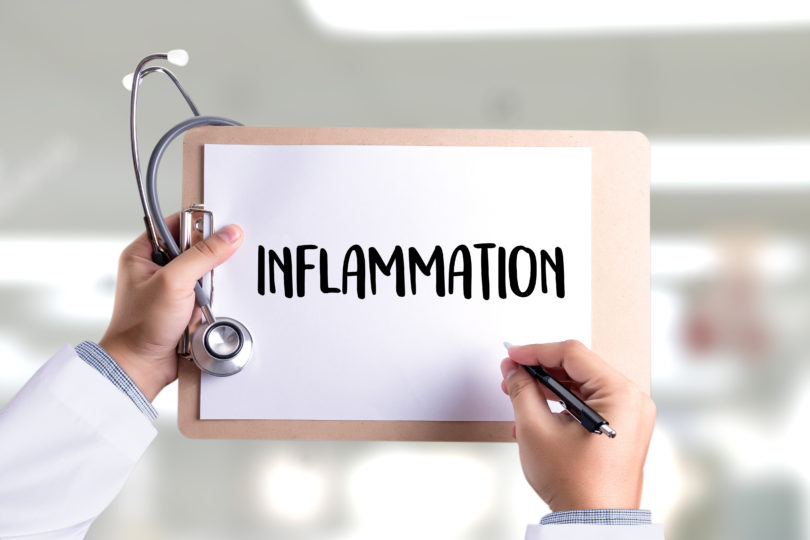What is inflammation and can you control it with CBD?
Before discussing the control of inflammation, let’s first understand what inflammation is. Inflammation is how the body responds to harmful stimuli such as infections or physical injury. For example, when we develop pneumonia, white blood cells travel to the lungs, destroy the bacteria, thus helping us to recover from the illness. Without our ability to develop inflammation, we would die from infections as minor as the common cold.
However, in some cases, inflammation does not protect us, but in-fact harms us. Examples are multiple sclerosis, inflammatory bowel disease, rheumatoid arthritis, contact dermatitis, certain types of cancer, allergic asthma, Type I diabetes, and even atherosclerotic heart disease. In such cases, the control of inflammation might be beneficial.
What is CBD?
CBD is one of over 100 molecules that are produced by the cannabis plant. Doses of up to 4,000-mg a day have been taken without the experience of any side effects.
Unlike THC, which works primarily by binding to the CB1 and CB2 receptors on the cell surface. CBD, on the other hand, exerts its effects inside the cell. This is believed to be the reason why CBD has no addictive potential.
CBD and the control of inflammation

Multiple sclerosis: Multiple sclerosis is an autoimmune disorder where the T cells of the body cause the myelin that coats the nerves to disintegrate. As a result, one experiences muscle spasms, weakness, neuropathic pain, and tremor. CBD helps to control multiple sclerosis by suppressing the inflammation thus preserving the integrity of the nerves.
Inflammatory bowel disease: The cells that line the intestine are responsible for our ability to absorb food. When they become inflamed we can develop diarrhea, intestinal bleeding, and ultimately malnutrition. CBD suppresses the cytokines which cause this inflammation, thus helping to heal the intestines and control the disease.
Rheumatoid arthritis: Rheumatoid arthritis is a chronic inflammatory condition that affects one out of a hundred people in the world. It presents as joint destruction, joint stiffness, swelling, and tenderness. CBD inhibits TNF-α, which is a protein produced by the body that causes the inflammation and joint destruction of arthritis.
Contact dermatitis: When the skin is exposed to an allergen, there is swelling, itchiness, redness, dryness, and pain. When CBD is applied topically, it decreases the cytokines, which are the proteins produced by the body that cause the skin changes resulting in the dermatitis.
Cancer: The inflammatory process is responsible for nearly 20% of all deaths from cancer worldwide. This has been proven by identifying inflammatory mediators, such as chemokines, cytokines, and prostaglandins in tumor tissue. CBD, by acting as a potent anti-inflammatory agent has been shown to decrease tumor growth by depriving the cells of oxygen, thus promoting cancer cell death.
Allergic asthma: Allergic asthma is caused by hyper-responsiveness of the lungs to allergens. There is inflammation and subsequent mucus secretion by the goblet cells of the airways. CBD decreases the sensitivity of the lungs to allergens and the result is improvement in asthma.
Type 1 Diabetes: In Type 1 diabetes, inflammation caused by lymphocytes destroys the insulin-producing pancreatic beta cells. CBD, when given early enough in the disease process, blocks this inflammatory response and preserves the ability of the pancreas to produce insulin.
Atherosclerosis: Cardiac disease is the number one cause of death in the world. Atherosclerosis is associated with inflammation of the cells that line the coronary arteries. CBD helps to decrease coronary disease by its anti-oxidant effects. This is another way of saying that CBD decreases the “stickiness” of the monocytes that line the blood vessel walls. The result is improved delivery of oxygen to the heart.
Control of inflammation with CBD – take home points
CBD offers many of the same benefits as THC, but without any psychoactive effects, tolerance, addiction, or withdrawal.
In addition, CBD is a superior agent in reducing inflammation. Therefore, along with the recreational uses of cannabidiol, we have shown that CBD offers substantial and unique medical benefits.
Control of inflammation with CBD – References:
“Cannabinoids as novel anti-inflammatory drugs” Future Med Chem. 2009 Oct; 1(7): 1333–349.
“Molecular characterization of an enzyme that degrades neuromodulatory fatty-acid amides.” Nature. 1996 Nov 7; 384(6604):83-7.
“A comparative study on cannabidiol-induced apoptosis in murine thymocytes and EL-4 thymoma cells.” Int Immunopharmacology. 2008 May; 8(5):732-40.
“The endocannabinoid system is dysregulated in multiple sclerosis and in experimental autoimmune encephalomyelitis.” Brain. 2007 Oct; 130(Pt 10):2543-53.
“CB2 cannabinoid receptors as an emerging target for demyelinating diseases: from neuroimmune interactions to cell replacement strategies.” Br J Pharmacol. 2008 Jan; 153(2):216-25.
“A role for CB2 receptors in anandamide signaling pathways involved in the regulation of IL-12 and IL-23 in microglial cells.” Biochem Pharmacol. 2009 Jan 1; 77(1):86-100
“Fundamentals of neurogastroenterology.” Gut. 1999 Sep; 45 Suppl 2():II6-II16.
“CB1 cannabinoid receptor antagonism: a new strategy for the treatment of liver fibrosis.” Nat Med. 2006 Jun; 12(6):671-6.
“The endocannabinoid 2-arachidonoyl glycerol induces death of hepatic stellate cells via mitochondrial reactive oxygen species.” FASEB J. 2007 Sep; 21(11):2798-806.
“Suppression of human macrophage interleukin-6 by a nonpsychoactive cannabinoid acid.” Rheumatology Int. 2008;28:631–635
“The nonpsychoactive cannabis constituent cannabidiol is an oral anti-arthritic therapeutic in murine collagen-induced arthritis.” Proc Natl Acad Sci U S A. 2000 Aug 15; 97(17):9561-6.
“Cannabinoids: potential anticancer agents.” Nat Rev Cancer. 2003 Oct; 3(10):745-55.
“Inflammation and cancer: back to Virchow?” Lancet. 2001;357:539–545.
“Immunologic basis of antigen-induced airway hyperresponsiveness.” Annu Rev Immunol. 1999; 17():255-81.
“Cannabidiol attenuates high glucose-induced endothelial cell inflammatory response and barrier disruption.” Am J Physiol Heart Circ Physiol. 2007 Jul; 293(1):H610-9.
“Beta cell death and protection.” Ann N Y Acad Sci. 2003 Nov; 1005():32-42.
“Neuroprotective and blood-retinal barrier-preserving effects of cannabidiol in experimental diabetes.” Am J Pathology. 2006 Jan; 168(1):235-44.
“Cannabidiol arrests onset of autoimmune diabetes in NOD mice.” Neuropharmacology. 2008 Jan; 54(1):244-9
“Anti-inflammatory Properties of Cannabidiol, a Nonpsychotropic Cannabinoid, in Experimental Allergic Contact Dermatitis.” J Pharmacol Exp Ther. 2018 Jun;365(3):652-663.
“Transdermal cannabidiol reduces inflammation and pain-related behaviors in a rat model of arthritis.” Eur J Pain. 2016 Jul; 20(6): 936–948.
“Cannabidiol as an emergent therapeutic strategy for lessening the impact of inflammation on oxidative stress.” Free Radic Biol Med. 2011 Sep 1;51(5):1054-61.
“Cannabidiol, a non-psychotropic plant-derived cannabinoid, decreases inflammation in a murine model of acute lung injury: role for the adenosine A(2A) receptor.” Eur J Pharmacol. 2012 Mar 5;678(1-3):78-85.
“Cannabidiol reduces intestinal inflammation through the control of neuroimmune axis.” PLoS One. 2011;6(12):e28159.









